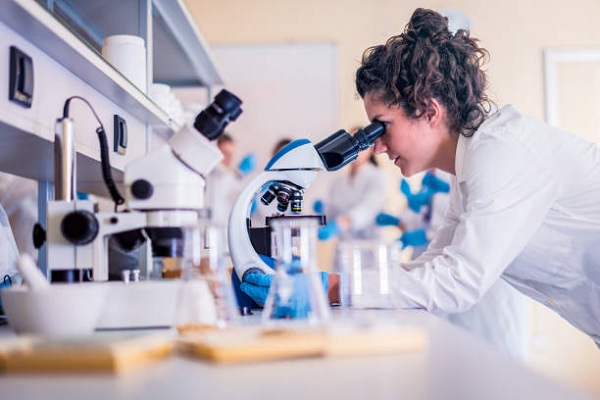Where Can A Microbiologist Work In Nigeria- Are you a graduate of Microbiology or you are still studying the course in school? Do you want to find out the career path a microbiologist can follow in Nigeria? Then you should follow this post to the end. This article will answer the question on your mind and that of others; “where can a microbiologist work in Nigeria”.
Where Can A Microbiologist Work In Nigeria
What Is Microbiology?
Microbiology is a branch of science that deals with the study of microorganisms and other kind of microscopic life in existence. Some of the microorganisms studied include fungi, bacteria, algae, viruses, prions, etc. There are different aspects of microbiology and they include: Mycology, Bacteriology, Virology.
i. Mycology
This deals with the study of Fungi, their genetic properties, biochemical properties, taxonomic and economic importance. Fungi are very useful in medicine and industry. A lot of drugs have been developed as a result of mycological research. Some of these drugs include antibiotics (e.g penicillin, tetracycline,streptomycin), statins, etc,
ii. Bacteriology
It is the aspect of microbiology that handles the study of bacteria. Here, you study the morphology, ecology, genetics and biochemical properties of bacterias. The study of bacteriology has led to the development of different vaccines for some deadly diseases e.g tetanus toxoid vaccine, diphtheria toxoid, cholera, tyhoid, etc. Bacterias are also useful in industry in the production of cheese, yogurt, vinegar, etc. In agriculture, bacterias are useful in compost and fertilizer production.
iii. Virology
It is the branch of microbiology that studies viruses and its host cells. Viruses are studied and manipulated for different purposes. Viruses can be used to treat illness , diagnose infections. Also in the making of vaccines , viruses find relevance and development of new drugs.
Where Can A Microbiologist Work In Nigeria ?
Microbiologist study microorganisms that causes disease and those that damage the environment. They also study useful microorganisms. The course can be studied in most universities under the faculty of science for a duration of 4 years.
A microbiologist can work in the following areas:
- Environmental/ Public health
- Environmental Sciences
- Industry
- Pharmaceuticals
- Clinic/ Hospitals/Veterinary Hospitals
- Academics
- Food/ drug Agencies
- Sales/ Technical sales representative
- Journalism
- Petroleum Industry
- Teaching
1. Environmental/ Public health
Microbiologist work to study microorganism and their effect on the environment. In public health , they study microorganism and how some of them can cause disease and other useful microorganisms that can be used to treat (handle) those diseases
2. Environmental Sciences
In environmental sciences, microbiologist study how microorganisms relate with themselves and the environment. They study up on how some of these microbes can be used to clean up polluted environment. How they can be used to foster growth of crops is also studied.
3. Industry
Microbiologist can get to work in industries where they study and solve issues relating to industrial production processes. For instance, they can oversee microbial activities employed in cheese production for quality, etc.
4. Pharmaceuticals
Microbiologists also work in pharmaceuticals in the quality department. Here, they ensure the quality of raw materials before used for production. They also monitor the microbiological quality of the environment. They validate test method that are used in testing finished products to ensure they meet up with microbiological standard.
5. Clinic/ Hospitals/Veterinary Hospitals
Microbiologist can carry out some roles as Clinical scientists in hospitals. They carry out research and give scientific advice to the staffs at the hospital. They also work in medical laboratories, carrying out laboratory tests to detect disease in both humans, plants and animals.
6. Academics
Microbiologist can also work in colleges, universities, teaching and carrying out research activities. You will also spend some time writing articles, carrying out experiments, analyzing the results and making relevant publication. You will need to obtain higher degrees: M.Sc and Ph. D respectively.
7. Food and Drug Agencies
A microbiologist work in Nigeria in food and drug agency such as NAFDAC. Here, they carry out different screening/ quality test to ascertain that the drugs, food and cosmetics are in the right condition for human use/ consumption. SON (Standard Organization of Nigeria) is another relevant organization for a microbiologist
8. Sales/ Technical Representative
Microbiologists can also work in the role of a sales representative to market and supply medicines and medical equipment. If as a microbiologist, you have some flair for marketing, then you can function well in this role. You will not only be involved in sales but also in providing scientific/ medical education to your clients.
9. Journalism
If you are skilled at writing , you can take up Journalism as a microbiology work in Nigeria. As a medical journalist, you can make investigations into certain diseases, microorganisms and other factors causing them and how to remedy such.
10. Petroleum Industry
Another area of microbiologist work in Nigeria is in the petroleum industry. You can work in the petroleum industry such as Shell, Chevron, Mobil, etc. Some of your roles will include:
- Use of microorganisms to convert crude oil to natural gas
- Monitor and study microorganisms in the oil field that can cause corrosion of oil/gas pipeline and some other oil production equipment
- Use microorganisms to recover oil from spent reservoirs
- Bioremediation: using microorganisms to clean up areas polluted by oil
11. Teaching (K-12)
Teaching is another area of microbiologist work in Nigeria. A microbiologist can also teach in schools with curriculum for kindergarten to grade 12. Most especially the higher classes, if you have a passion for teaching , you can apply to teach in a school
Other Fields A Microbiologist Work In Nigeria
There are other science field a microbiologist can work and function. These include:
- Biotechnology
- ClinicaL research
- Biomedical sciences
- Pharmacology
- Nanotechnology
- Food technology
- Ecology
- Forensic science
- Marine biology
- Environmental Engineering
Last Word
I believe I have been able to answer the question on your mind ; where can a microbiologist work in Nigeria? The list in this article is not exhaustive , there are some other organizations a microbiologist can work even. Some of those organizations wont even require a particular field of study. All they would require is a good Bachelor degree, a good grade and a smart brain.
Frequently Asked Questions
Can I work in an hospital in Nigeria as a microbiologist?
Yes, a microbiologist can work in hospitals in Nigeria. They can also work in universities, research institutes, pharmaceuticals, food and beverage, agriculture, medical schools, government laboratories, petroleum industry, etc.
Is microbiology worth studying?
Yes. Microbiology is a course that is worth studying. Microbiologist are in great demand in different industries all over the world.
Reference
- www. nigerianfinder. com –Careers in Microbiology
- www. medcraveonline. com – Brief introduction to Pharmaceutical Microbiology
- www. wikipedia. com – Mycology






